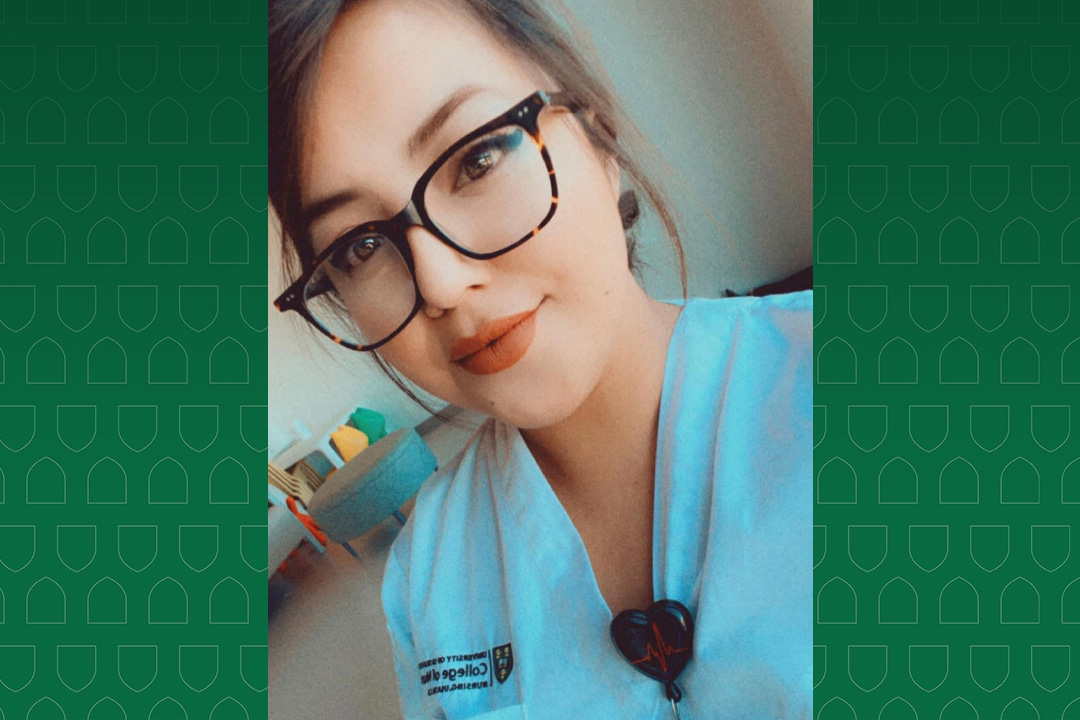
USask nursing student aims to advocate for patients
Jenna Masey Bear was honoured for her leadership during the Indigenous Student Achievement Awards Ceremony on March 9.
By Shannon BoklaschukJenna Masey Bear decided to pursue a degree at the University of Saskatchewan (USask) after working alongside nurses for 11 years in her job as a continuing care aide.
“I always desired to be more involved in patient care by actively supporting, advocating, promoting, intervening, and aiding in the healing process,” said Bear. “While there are many other reasons, I really want to help and support people through some of their most vulnerable moments in their lives.”
Bear is now in her final year of studies in USask’s College of Nursing, where she is pursuing a Bachelor of Science in Nursing (BSN) degree. Bear is from the Mosquito Grizzly Bear’s Head Lean Man First Nation and was raised by her kohkom (grandmother) and her late mooshom (grandfather) at Little Pine First Nation.
“Growing up in the community and by my grandparents, I was raised to honour and respect my traditional roots,” she said. “It is here where these core values, morals, and beliefs enabled me to have continued faith in my educational journey, and continued to motivate me to keep trying, despite continuous obstacles I had to face throughout the years to be where I currently am.”
On March 9, during Indigenous Achievement Week at USask, Bear was honoured for her leadership at the Indigenous Student Achievement Awards Ceremony at Gordon Oakes Red Bear Student Centre. The award recognizes students who have demonstrated exemplary leadership on or off campus.
“I was extremely happy, thankful, and to be honest, stunned,” said Bear, when asked how she felt after receiving the good news about the award.
Bear serves as a representative with the Saskatchewan Nursing Student Association (SNSA) and has worked with advisors in the College of Nursing to host mentorship events. She has also volunteered to assist with college recruitment events and is as a mentor and a presenter with the Brave Spaces Project, a pilot project that provides mentorship and support for students as they navigate their first clinical experience.
In May, Bear and two other students will travel to St. John’s, Newfoundland and Labrador, to present at the Canadian Association of Schools of Nursing (CASN) Biennial Canadian Nursing Education Conference to promote anti-discriminatory pedagogy in nursing education. Bear is known as a student who shows exemplary leadership and diplomacy in the College of Nursing and within the larger community, including her advocacy work to bring awareness to issues around homelessness, addictions, and mental health in honour of her late brother.
“As a student mentor and as the SNSA Indigenous representative, I really want to help others who may need additional support, guidance, and resources to aid in their educational journey,” said Bear. “As someone who can relate to others and provide support, I believe I can be a great asset as I have had to overcome a lot of barriers and obstacles in my nursing journey.”
Bear noted that it took her nearly eight years to complete the four-year BSN program because she took time off from her studies to care for her brother. She believes sharing her personal story can help others.
“In nursing school, I faced plenty of obstacles and moments that forever changed my life, such as holding my brother’s hand while he was on life support, being with him during his heart procedures while juggling clinicals and school. In my final year of school, I grieved the loss of my late brother, who lost his battle to mental health and addictions,” she said.
“Then, I took care of my mother, who was facing her own health concerns in the intensive care unit for four months. It is here where we faced a family crisis due to the loss of my beloved brother, where I took on the responsibilities of raising my little sister. I believe my story can resonate with others.”
Despite feeling defeated during those difficult times, Bear said she stayed strong and continued to believe that she could overcome “whatever life has to throw at me.” She now aims to “help prevent others suffering with their own obstacles and let them know that they are not alone in this fight and that there is additional support out there.”
“Having been close with my brother, his passing made a very significant impact on my life, and I aspire to help those who share the same life challenges as him,” Bear said. “In addition, I hope to bring change for our Indigenous population and advocate for awareness of what our vulnerable populations face. Hearing the word ‘safe’ from my Indigenous patients is such a powerful word. Just from my presence alone, I can make a patient feel safe, protected, and comfortable, and that’s a powerful gift to have as an Indigenous nurse.”
Bear said one of the best parts of studying at USask has been taking on leadership roles and getting involved with various student groups and initiatives. As a university student, she also found her voice, her confidence, and her passion, and discovered a love for advocacy in nursing.
“My advice for future nursing students is to not give up,” said Bear. “Keep trying; don’t let failure scare you or stop you from achieving your goals. Set yourself free from comparison, as everyone’s educational journey is different; everyone faces unique challenges, obstacles, and barriers. Give yourself credit and be proud of what you have achieved and are about to achieve.”

